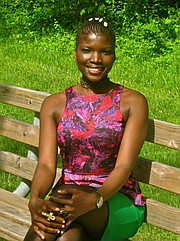I came to the U.S. in my early 20s for college from my village in Middle Belt, Nigeria. Prior to that, I was an international student in neighboring West African countries Liberia and Sierra Leone. One of the many things I appreciate about my upbringing is my parents' willingness to let their children explore life. The two things expected of us were to succeed in whatever we did and contribute in building our community.
When my partner and I told folks that we were moving to Mississippi, many of them asked, "Of all places, why Mississippi?" They expressed concern for our safety, citing lynching stories and depressing poverty statistics. As a granddaughter of a diviner, I wondered whether the concerns were premonitions. Nonetheless, we went ahead with our plan.
Most of my education has been at private white institutions. I saw going to Mississippi and working at an HBCU as an opportunity to give back to the African American community because their struggle for human and civil rights cleared the path for many immigrants in the U.S.
Upon arrival at the Jackson bus station, I was surrounded by many shades of beautiful chocolate faces. I felt a sense of akwaaba (welcome), as though I had arrived in Accra, Ghana. But as the proverbial wisdom of my ancestors, the Yotti/Bali (Chamba) teaches us, "A rolling stone gathers no moss" (time brings clarity). Over a period of several months, this positive feeling became tempered with a sense of disappointment. Life is tough in Mississippi, and poverty is extreme. The flight of (white) wealth from the capital city is evident. Employment opportunities and investments in Jackson are severely limited. Downtown Jackson only has a few businesses but, like many black communities, it has an over-abundance of churches.
My neighborhood in west Jackson was a food desert. To buy fresh vegetables, we had to travel to white neighboring cities or wait to visit the farmers market on weekends. These realities explain why many African Americans, especially those in the South, struggle with obesity and related health issues. Many Jackson residents buy bottled water because the city pipes have not been properly maintained for decades. It is not uncommon to walk through west Jackson and see water flowing out of pipes for weeks. Our community was overwhelmed with dilapidated homes. Roads are overrun with potholes and uncleaned gutters.
Despite the challenges of poverty and bad infrastructure, Jacksonians retain a remarkable vibrancy. As a Nigerian woman, I was especially impressed with the black community's efforts to honor their African heritage. Mississippi sometimes reminds me of home. A women's group based in Jackson organizes an annual Kwanzaa event to celebrate their cultural roots. Some Mississippians still grow their food, just as we do in my village. I once took an hour-long ride to my neighbor's 90 acres of land, where his parents farmed several crops. On public buses, strangers greet you as though you knew each other. In the summer evenings, neighbors sit shirtless on their verandas and chat until mosquitoes start to bite, just like in my village.
People are willing to go an extra mile to help each other. When we were looking for a house to rent, my partner's colleague took a few days after work to help. In my African Traditional Religions course at Jackson State University, students were eager to share stories about relatives who practice Vodou (Voodoo) or "roots," even though they identify as Christians. On the other hand, some Mississippians have internalized anti-African sentiments. I was reported by a student and subsequently scolded by my supervisor for introducing myself as an Africanist (i.e. pro-Africa).
Notwithstanding my complicated experiences in Mississippi, I saw hopeful signs of potential for progress. Organizations like Cooperation Jackson and the Malcolm X Grassroots Organization are advocating for policies that would benefit underserved communities. The Perkins Foundation trains young leaders in Jackson. To address the lack of summer art education for children in rural Gloster, Miss., Ms. Margaret and Quincy Troupe use their celebrity connections with Terry McMillan, Rachel Griffiths, Danny Glover and others to fill this gap. We attended Ms. Troupe's annual event and were inspired.
And Anderson United Methodist, the home church of the late Mayor Chokwe Lumumba, encourages revolutionary thinking, provides a platform for local artists and contributes scholarships for African students to study at Africa University in Zimbabwe.
As we empathize with the poor overseas, let us not forget places like Mississippi, where blacks are struggling against daunting barriers here in the U.S.
Yoknyam Dabale is a pan-Africanist, environmentalist, gender and human-rights advocate, and lecturer at Knox College in Galesburg, Ill.



Comments
Use the comment form below to begin a discussion about this content.
comments powered by Disqus